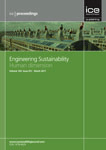
Proceedings of the Institution of Civil Engineers-Engineering Sustainability
Scope & Guideline
Transforming Ideas into Sustainable Engineering Solutions
Introduction
Aims and Scopes
- Sustainable Construction Practices:
Research on sustainable materials and methods aimed at reducing the environmental impact of construction, including lifecycle assessments, green building techniques, and the use of alternative materials. - Energy Efficiency in Engineering:
Exploration of energy-efficient designs and technologies in civil engineering, with a focus on reducing energy consumption in buildings and infrastructure through innovative solutions. - Climate Adaptation and Resilience:
Studies addressing the impact of climate change on civil engineering projects and the development of strategies to enhance resilience and adaptability in infrastructure. - Waste Management and Resource Efficiency:
Research focused on minimizing waste in construction processes, recycling materials, and promoting circular economy principles within the industry. - Integration of Digital Technologies:
Investigation into the application of digital tools, such as Building Information Modeling (BIM) and blockchain, to improve project management, efficiency, and sustainability in construction. - Social Value and Community Engagement:
Focus on the social implications of engineering projects, including stakeholder engagement, social value creation, and community-led initiatives.
Trending and Emerging
- Decarbonization Strategies:
An increasing number of studies focus on reducing carbon emissions in construction, such as low-carbon materials and energy-efficient design, reflecting the industry's urgent need to address climate change. - Digital Transformation in Construction:
The rise of digital technologies, including blockchain and advanced modeling techniques, is a significant trend, highlighting the importance of data-driven decision-making in improving sustainability. - Innovative Waste Utilization:
Research on the use of waste materials in construction, such as recycled glass or industrial by-products, is becoming more prevalent, showcasing a shift towards circular economy practices. - Performance-Based Sustainability Assessment:
Emerging methodologies for assessing sustainability that consider both environmental and social factors are gaining traction, indicating a holistic approach to evaluating construction projects. - Community-Centric Approaches:
A trend towards engaging local communities in sustainability initiatives is evident, reflecting an increased focus on social value and stakeholder involvement in engineering projects.
Declining or Waning
- Traditional Construction Materials:
Research on conventional materials such as standard concrete and asphalt has decreased as attention shifts toward sustainable alternatives and innovative composites. - General Environmental Regulations:
While environmental regulations remain important, specific studies focusing solely on compliance without addressing innovative solutions or practices are less frequently published. - Impact Studies Without Contextual Frameworks:
Research papers that analyze impacts without integrating them into broader sustainability frameworks or practical applications have seen a decline, as the journal emphasizes actionable insights.
Similar Journals

International Journal of Sustainable Construction Engineering and Technology
Transforming construction through sustainable methodologies.International Journal of Sustainable Construction Engineering and Technology is a pivotal publication in the evolving fields of building and construction, civil and structural engineering, and environmental engineering. Published by University Tun Hussein Onn Malaysia, this journal serves as a platform for the dissemination of innovative research and developments dedicated to sustainable practices in construction and engineering. With an ISSN of 2180-3242, this journal has been contributing to the academic community since its inception, with coverage from 2018 through 2024. While currently categorized in quartiles Q4 for both building and construction and civil engineering, and holding similar ranks in environmental engineering, the journal continues to strive for academic excellence and broader outreach. The journal, although currently not an open access platform, remains an important resource for professionals, researchers, and students aiming to explore sustainable methodologies and technologies in construction. We invite you to engage with cutting-edge studies that address environmental impacts in engineering and contribute to a sustainable future in infrastructure development.
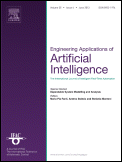
ENGINEERING APPLICATIONS OF ARTIFICIAL INTELLIGENCE
Harnessing AI to Revolutionize Engineering PracticesENGINEERING APPLICATIONS OF ARTIFICIAL INTELLIGENCE, published by PERGAMON-ELSEVIER SCIENCE LTD, stands as a premier journal within the disciplines of Artificial Intelligence, Control and Systems Engineering, and Electrical and Electronic Engineering. With an impressive Q1 ranking across these categories in 2023 and a strong presence recognized by Scopus rankings, this journal provides a vital platform for disseminating cutting-edge research innovations and applications that harness the power of AI in engineering. Spanning over three decades of scholarly contributions from 1988 to 2024, the journal appeals to a diverse audience including researchers, industry professionals, and students eager to explore the transformative impacts of artificial intelligence on engineering practices. While not an open-access journal, it ensures that significant advancements in the field remain accessible through library subscriptions. By fostering scholarly dialogue and advancing knowledge in engineering applications of AI, this journal plays an integral role in shaping the future of technology and innovation.
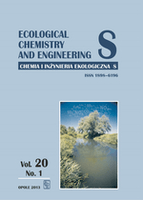
Ecological Chemistry and Engineering S-Chemia I Inzynieria Ekologiczna S
Advancing Ecological Solutions for a Sustainable FutureEcological Chemistry and Engineering S, a prominent journal in the field of Environmental Chemistry and Engineering, provides a platform for innovative research and critical discussions surrounding ecological solutions and sustainable practices. Published by SCIENDO, this peer-reviewed journal is accessible to researchers and professionals dedicated to advancing our understanding of ecological systems and sustainable engineering practices. With an ISSN of 1898-6196 and an E-ISSN of 2084-4549, the journal has established itself in the academic community, reflected by its Q3 ranking in both Environmental Chemistry and Environmental Engineering categories as of 2023. Covering significant advancements from 2008 to 2024, it serves as an essential resource in advancing knowledge and fostering collaborations within interdisciplinary fields. Despite not offering open access, the journal remains an invaluable resource for researchers and students aiming to contribute to ecological sustainability strategies worldwide.

Engineering Reports
Bridging theory and application in engineering and computer science.Engineering Reports is a premier open-access journal published by Wiley, dedicated to advancing the fields of Engineering and Computer Science. Since its inception in 2019, this journal has rapidly gained recognition, achieving a commendable Q2 ranking in both the engineering and computer science categories in 2023, evidencing its impactful contributions to the scientific community. With an impressive Scopus rank of #70/307 in General Engineering and #63/232 in General Computer Science, the journal is well-positioned to disseminate cutting-edge research and foster innovation. Researchers, professionals, and students will find value in its comprehensive scope, which includes emerging technologies and interdisciplinary studies, making it an essential resource for anyone involved in these dynamic fields. Accessible online, Engineering Reports aims to bridge the gap between complex engineering theories and practical applications, enhancing collaboration and knowledge sharing globally.
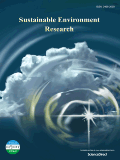
Sustainable Environment Research
Advancing sustainability through innovative research.Sustainable Environment Research, an esteemed journal published by BMC, serves as a pivotal platform for disseminating innovative research in the fields of Environmental Engineering, Pollution, and Renewable Energy. Established in 2016 as an Open Access journal, it facilitates the widespread sharing of knowledge and advancements across the globe, reflecting its commitment to enhancing environmental sustainability. With an impressive Q1 ranking in multiple categories, including Water Science and Technology and Pollution, the journal is recognized for its significant impact, currently holding a rank of 31st in Environmental Science - Water Science and Technology. The journal actively invites researchers, professionals, and students to contribute to crucial discussions around sustainable practices and technologies, thus addressing worldwide environmental challenges. Based in Taiwan but accessible internationally, Sustainable Environment Research provides a valuable resource for those dedicated to advancing the science of sustainability.

Results in Engineering
Transforming Challenges into Breakthroughs in EngineeringResults in Engineering is an esteemed open-access journal published by Elsevier, dedicated to advancing the field of engineering through high-quality, innovative research. Since its inception in 2019, this journal has rapidly established itself within the academic community, evidenced by its prestigious Q1 ranking in the Engineering (miscellaneous) category for 2023 and a remarkable ranking of #54 out of 307 in General Engineering according to the Scopus database, placing it in the 82nd percentile of its category. Located in the Netherlands, Results in Engineering provides a global platform for researchers, professionals, and students to disseminate their findings and foster collaboration across diverse engineering disciplines. The journal's commitment to open access ensures that valuable research is accessible to a wider audience, fostering innovation and knowledge sharing. With a progressive approach to publication, Results in Engineering seeks to enhance the engineering landscape by publishing cutting-edge studies that address contemporary challenges and solutions in the field.

Green Chemical Engineering
Pioneering research at the intersection of chemistry and ecology.Green Chemical Engineering, an esteemed journal published by KEAI PUBLISHING LTD, plays a pivotal role in advancing the field of sustainable chemical engineering. With an Open Access policy since 2020, this journal facilitates the free exchange of cutting-edge research and innovations that address critical environmental challenges. Based in China, it has rapidly gained recognition with impressive category quartiles, ranking Q1 in numerous relevant fields including Catalysis, Chemical Engineering (miscellaneous), Filtration and Separation, and Process Chemistry and Technology. Its presence in Scopus highlights its significance, with top rankings (e.g., Rank #4/19 in Filtration and Separation) placing it in the upper echelons of chemical engineering literature. Designed for researchers, professionals, and students alike, Green Chemical Engineering aims to foster a collaborative platform for the dissemination of pioneering work that contributes to a greener and more sustainable future.
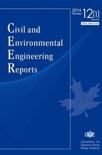
Civil and Environmental Engineering Reports
Transforming challenges into opportunities in engineering.Civil and Environmental Engineering Reports is a prestigious open access journal published by UNIV ZIELONA GORA, dedicated to advancing research in the dynamic fields of civil and environmental engineering. With its ISSN 2080-5187 and E-ISSN 2450-8594, the journal aims to disseminate innovative studies, methodologies, and practical applications that address contemporary challenges in these disciplines. Since its establishment in 2014 as an open access platform, it has emerged as a vital resource for researchers, professionals, and students alike, enabling free access to high-quality research findings. Situated at Licealna 9, Zielona Góra 65-417, Poland, the journal strives to foster collaboration and knowledge exchange within the global engineering community, making it an essential reading for anyone invested in civil and environmental engineering advancements.
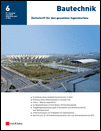
Bautechnik
Shaping the future of architecture and engineering excellence.Bautechnik is a premier academic journal in the fields of Building and Construction and Civil and Structural Engineering, published by ERNST & SOHN in Germany. With a history dating back to 1969 and a significant converged timeline through various years, this journal offers a rich repository of peer-reviewed research dedicated to advancing the principles, methodologies, and innovations within its domains. Bautechnik is currently ranked in the Q3 category for both building and construction, as well as civil and structural engineering, indicating its relevance and contribution to the academic community. Though it does not offer open access, its curated content is accessible to a global audience of researchers, professionals, and students striving for excellence in their fields. The journal aims to foster discussions and disseminate knowledge that impacts the future of construction, architecture, and engineering practices.
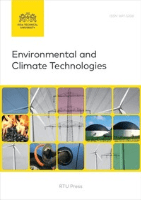
Environmental and Climate Technologies
Exploring Frontiers in Environmental Science and Renewable Energy.Environmental and Climate Technologies is a premier open-access journal dedicated to advancing knowledge in the fields of environmental science and renewable energy. Published by SCIENDO since 2009, this journal plays a crucial role in disseminating innovative research and interdisciplinary studies that address the pressing challenges posed by climate change and sustainable development. With its current positioning in the Q2 quartile for Environmental Science (miscellaneous) and Q3 for Renewable Energy, Sustainability and the Environment, it is recognized for its significant contributions to the academic community, ranking #107 out of 233 in General Environmental Science and #161 out of 270 in Renewable Energy. Hailing from Germany and operating under an open-access policy, Environmental and Climate Technologies ensures that research remains accessible to a global audience, fostering collaboration and discussion among researchers, professionals, and students alike. The journal invites rigorous scientific inquiries and practical solutions that can mitigate the impact of climate-related issues, making it a vital resource for those committed to environmental stewardship and sustainability.